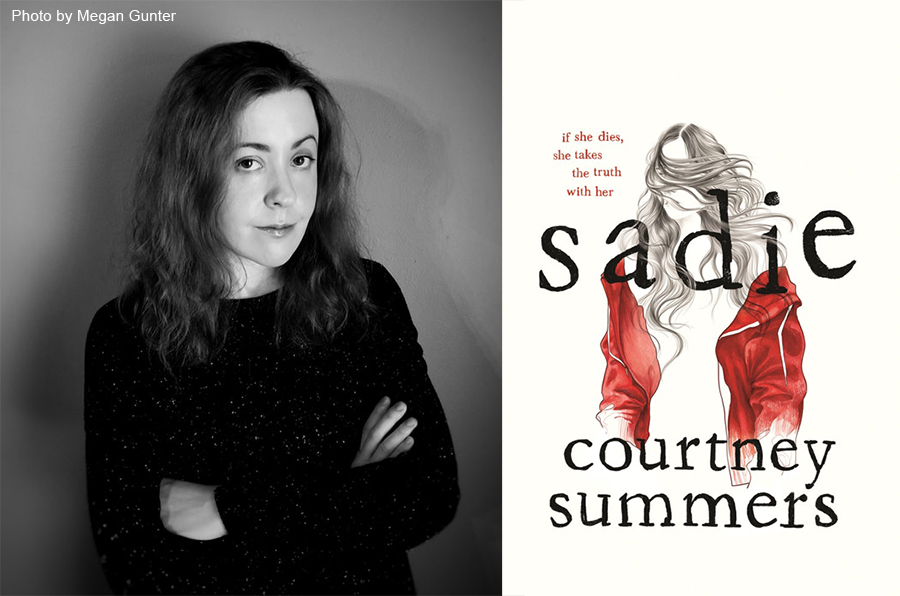Courtney Summers On True Crime, Podcasts, and “Sadie”
 The author of All the Rage, Some Girls Are, and This Is Not a Test offers another heartrending and complex YA novel about how society treats and even consumes young women. Chapters alternate between the title character, a 19-year-old trying to find her younger sister’s murderer, and a podcast based on the girls’ story, recorded months after Sadie has disappeared. SLJ’s starred review says, “it’s impossible to not be drawn into this haunting thriller of a book.” Courtney Summers discusses how this book subverts the “woman in danger” trope, the podcast spawned by Sadie (Wednesday Bks., Sept. 6, 2018; Gr 9 Up), and more.
The author of All the Rage, Some Girls Are, and This Is Not a Test offers another heartrending and complex YA novel about how society treats and even consumes young women. Chapters alternate between the title character, a 19-year-old trying to find her younger sister’s murderer, and a podcast based on the girls’ story, recorded months after Sadie has disappeared. SLJ’s starred review says, “it’s impossible to not be drawn into this haunting thriller of a book.” Courtney Summers discusses how this book subverts the “woman in danger” trope, the podcast spawned by Sadie (Wednesday Bks., Sept. 6, 2018; Gr 9 Up), and more.
What inspired you to write Sadie?
I’m fascinated by true crime, but I often wonder how well the category serves the narratives of victims who are no longer around to tell their own stories, and what the personal cost of choosing to tell those stories might be. I also wanted to explore the way we consume acts of violence against women and girls as a form of entertainment (and these acts of violence against them are often at the center of true crime stories), and the consequences.
The chapters not only move between time lines but also alternate narration styles. The novel includes excerpts from a podcast hosted by West McCray, a journalist investigating Sadie’s disappearance in the present, and chapters narrated by Sadie, a few months before West McCray’s search for her. How did you keep track of the two narratives?
I think I put the weight of that burden on my editor! She was better at keeping track of it than I was, and she caught any inconsistencies that might have found their way in. The biggest challenge for me was making sure the dual narratives propelled each other forward, especially because West and Sadie have different levels of access to various pieces of information throughout the book, at different times.
Were you already a podcast fan? Or have you become one? Any you would like to recommend?
I’ve become progressively more into them as the range of stories and topics grows. I love Criminal, First Draft with Sarah Enni, You Must Remember This, and S-Town, and two new favorites of mine are Forever 35 and Cults.
Congrats on the podcast and audiobook! Creating audio editions of Sadie was a must. Were you involved with the process of bringing your novel to the audio format?
I just got to hear the audiobook recently, and I’m obsessed with it, it’s so beautifully done. Beyond writing the source material, I was very uninvolved—and that was perfect for me, honestly! It’s exciting to have your work interpreted in a different medium by people who have the vision and skill. I would have nothing constructive to offer the team, because my brain doesn’t work that way. Macmillan Audio has that vision and skill, and what they did with this production is incredible. I love that I just got to basically sit back and enjoy the stellar results of their hard work.
In the novel, Sadie’s mom calls out West McCray’s “consumption” of her daughters’ stories. Why do you think so there are so many media fixated on “girlhood”—but often at the cost of girls themselves?
I think it’s because we’ve long treated girls as objects, things, forms of entertainment. Once you do that, you cultivate an idea of disposability. We demand to be entertained by female pain, and the moment we’re not, we move on to the next story, leaving that girl behind.
The “woman in danger” trope (often white, middle-class girls) is one we often see in true crime shows. How does Sadie fit or even subvert that trope?
Sadie is largely a commentary on that fixation and its consequences, what we see and what we’re determined not to see. I also tend to think of Sadie as having an invisible, third perspective, that of its audience, and the part we all play in a story like hers—because we all play a part. Sadie owes a lot to the true crime category, but it’s also less about inviting a reader into that space and more about asking them to ask: Why am I here? What do I get out of this?
This is a genre that invites audience participation and theorizing. When the Serial podcast first debuted, fans even used Reddit to conduct their own research. What kind of feedback have you received from teen and adult readers?
Readers do have theories, and they’ve approached me with them, but I can’t elaborate, because it’d be too much of a spoiler. They’re often hopeful I’ll give them something concrete in return—but my lips are zipped! (Sorry, readers!)
What are you working on next?
I don’t like to say too much about stuff that’s in the works, but I feel relatively safe promising that whatever it is, it will (hopefully) destroy its readers.
RELATED
The job outlook in 2030: Librarians will be in demand
The job outlook in 2030: Librarians will be in demand
ALREADY A SUBSCRIBER? LOG IN
We are currently offering this content for free. Sign up now to activate your personal profile, where you can save articles for future viewing






Add Comment :-
Be the first reader to comment.
Comment Policy:
Comment should not be empty !!!